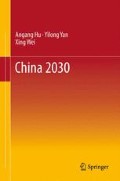Abstract
Since the beginning of human civilization, “equality for all and common prosperity” has been either the utopian dream of philosophers and poets or the grandiose rhetoric of politicians. However, the reality is quite different: “Behind the vermilion gates of the rich, meat and wine go to waste, but along the road are bones of the poor who have frozen to death” (a Chinese proverb). It has always been the case that “some families are joyful and some sad.” There exists an insurmountable divide among mankind; this stems from family background, region, and social status, and it is true both now and in ancient times, in China and other countries.
Socialism does not mean allowing a few people to grow rich
while the overwhelming majority live in poverty. No, that’s not
socialism. The greatest superiority of socialism is that it
enables all the people to prosper, and common prosperity
is the essence of socialism (Deng Xiaoping 1993a.
Deng Xiaoping (1990)
Access this chapter
Tax calculation will be finalised at checkout
Purchases are for personal use only
Notes
- 1.
Speech by Deng Xiaoping in April 1990 when he met with Xie Guomin, Chairman of Chia Tai Group of Thailand, from Deng Xiaoping Chronicles (1975–1997) Part II, p. 1312, Central Documentation Press, 2004.
- 2.
The first world refers to Shanghai and Beijing, which have attained a level higher than the average of upper-middle income countries; the second refers to Tianjin, Guangdong, Zhejiang, Jiangsu, Fujian, and Liaoning, which have attained a level higher than the lower-middle income countries but lower than upper-middle income countries; the third world refers to Hebei and central northeast China and north China, which have attained a level higher than the average of low-income countries but lower than lower-middle income countries. The fourth world refers to the poorer areas of the central and western areas of the country, areas inhabited by national minorities, rural areas, and remote regions that have levels lower than the average of low-income countries (Angang Hu 2001).
- 3.
The per capital GDP gap coefficient among the 50 states of the United States in 2000 was 0.32 (see Kessler and Lessmann 2009).
- 4.
China’s rural poverty standard is adjusted annually. It was 100 yuan/year in 1978, 300 yuan/year in 1990, and 625 yuan/year in 2000. The current standard for a poor county is 1,196 yuan/year (used since 2009).
References
Angang Hu (ed) (Feb 2001) Regions and development: New Western Development Strategy. China Planning Press, Beijing
Angang Hu (2008) On China’s political economics (1949–1976), 3rd edn. Tsinghua University Press, Beijing, p 534
Angang Hu, Wang Shaoguang, Kang Xiaoguang (Jan 1995) Report on China’s regional disparities. Liaoning People’s Publishing House, Shenyyang
Kessler AS, Lessmann C (Mar 2009) Interregional redistribution and regional disparities: how equalization does (not) work
Deng Xiaoping (1993a) Seize the opportunity to develop the economy, December 24 1990. In: Selected works of Deng Xiaoping, vol III. People’s Publishing House, Beijing, p 364
Deng Xiaoping (1993b) There is No fundamental contradiction between socialism and a market economy October 23, 1985. In: Selected works of Deng Xiaoping, vol III. People’s Publishing House, Beijing, p 149
State Statistical Bureau (2011) China Statistical Abstract 2011.China Statistical Press, Beijing, p 106
World Bank (Feb 2006) World development 2006: equity and development. Tsinghua University Press, Beijing, p 132
World Bank Economic Study Tour (1983) China: development of socialist economy, Chinese edn. China Finance and Economics Press, Beijing
Zhang Ping (ed) (Apr 2011) Reader guide, “12th Five-year Program for national economic and social development of the People’s Republic of China”. People’s Publishing House, Beijing, p 336
World Bank (Mar 2009) From poor areas to poor people: China’s evolving poverty reduction agenda. An assessment of poverty and inequality in China
Author information
Authors and Affiliations
Rights and permissions
Copyright information
© 2014 Springer-Verlag Berlin Heidelberg
About this chapter
Cite this chapter
Hu, A., Yan, Y., Wei, X. (2014). A Society with Shared Wealth. In: China 2030. Springer, Berlin, Heidelberg. https://doi.org/10.1007/978-3-642-31328-8_7
Download citation
DOI: https://doi.org/10.1007/978-3-642-31328-8_7
Published:
Publisher Name: Springer, Berlin, Heidelberg
Print ISBN: 978-3-642-31327-1
Online ISBN: 978-3-642-31328-8
eBook Packages: Business and EconomicsEconomics and Finance (R0)

